Global
Copyright@ Australian Catholic University 1998-2026 | ABN 15 050 192 660 CRICOS registered provider: 00004G | PRV12008
Copyright@ Australian Catholic University 1998-2026 | ABN 15 050 192 660 CRICOS registered provider: 00004G | PRV12008
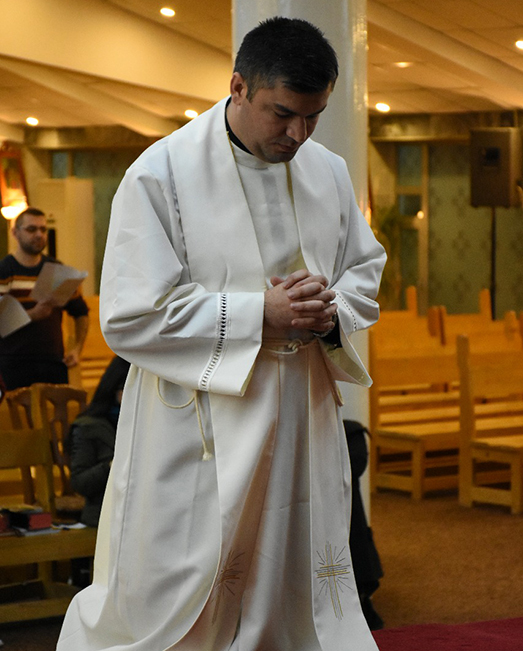
How the survival of an ancient religious community rests on the hopes of Iraq’s first Catholic university.
There was a time when Father Dankha Joola had little hope for the survival of his community in Iraq.
“It’s very difficult for me to say this,” said Fr Dankha, of the Chaldean Archdiocese of Erbil, “but to be honest, sometimes I’ve felt like there’s no future for us here.”
In the years after the downfall of dictator Saddam Hussein, Christians in the troubled nation were subjected to an open campaign of harassment at the hands of hard-line Islamists.
But the leaders of the Chaldean community of northern Iraq sensed the worst was still to come. And they were right.
“One very bad thing that happened at that time was that my teacher, a well-respected priest, was killed outside of our Church in Mosul,” Fr Dankha said.
Islamist fighters gunned down Father Ragheed Ganni and three deacons after Sunday mass in June 2007, when the parish priest refused to shut down his church.
His brutal murder, and the subsequent kidnapping and killing of Archbishop Paulos Rahho in 2008, rocked Iraq’s Chaldean community. And it prompted some soul-searching in the young Dankha Joola.
“I realised we needed leaders at that time, because without leaders, we cannot maintain our people,” he said.
“When you get such a clear calling from God, you cannot ignore it, and that's why I decided to enter the seminary, to study and become a priest so I could serve my community.”
The crisis escalated further when Islamic State jihadists stormed northern Iraq’s villages with an ultimatum for Chaldean Catholics: “Convert, flee or die”.
Many felt they had no choice but to leave.
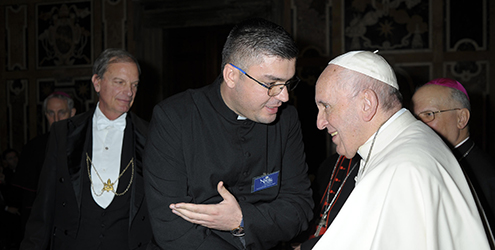
Father Dankha with Pope Francis.
Before 2003, Iraq’s Christian population numbered upwards of 1.5 million; it’s now estimated as little as a quarter of them remain.
Islamic State’s initial assault alone displaced some 125,000 Chaldeans from Mosul and other Christian towns like Qaraqosh and Tel Askof.
The situation prompted Reverend Bashar Warda, the Chaldean Archbishop of Erbil, to warn that Christianity in Iraq was “perilously close to extinction”.
“In Iraq there is no redress for those who have lost properties, homes and businesses,” he said. “Tens of thousands of Christians have nothing to show for their life’s work, in places where their families have lived for thousands of years.”
Archbishop Warda decided the best way to respond to the turmoil was to educate young people.
He wanted to build a Catholic university in Iraq as an act of defiance – “a way of fighting back” – but also as a beacon of hope that would promote peace and convince his people to stay.
In a visit to Australia in 2015, he sought support from ACU to establish a university in Erbil, the capital of Iraqi Kurdistan.
But it wasn’t funds that the Archbishop needed most; rather, it was a chance to turn capable and committed Chaldeans into future leaders.
He chose Fr Dankha as a recipient of an ACU scholarship aimed at assisting in the establishment and growth of the new Catholic University of Erbil (CUE).
“Archbishop Warda believes in the educational system in Australia, and at that time of crisis in our country, he told me, ‘we need leaders, so you should go’,” said Fr Dankha, who until then was a humanitarian aid worker at Iraq’s refugee camps.
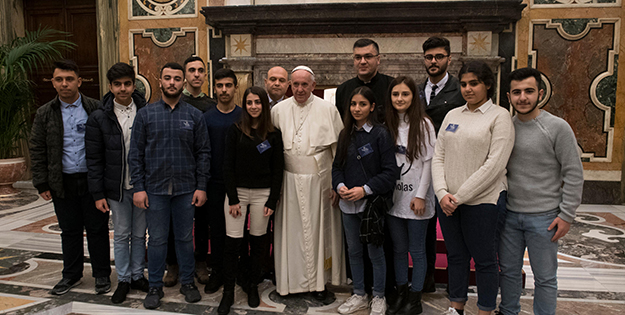
Fr Dankha arrived in Sydney in 2016 to study his Master of Educational Leadership at ACU’s North Sydney Campus. In 2018, after completing his degree, he returned to Iraq and took up his current role as Vice-Chancellor of Public Relations at CUE.
“In Iraq, we have many intelligent people with a sense of mission, but we don't have that many opportunities for them to study,” said Fr Dankha, who is also the parish priest at Erbil’s St Joseph’s Cathedral.
“ACU provides us with these opportunities, to help to educate our future leaders, and that’s why our collaboration is so important.”
While CUE is still in its infancy, it’s already providing Chaldeans with a reason to stay in Iraq.
“The first thing our university provides is jobs for our people, and this is important because without employment, they will not stay and we will not be able to maintain Christianity in Iraq,” Fr Dankha said.
“We also provide education for free to all of our students, and education is crucial, because it ensures opportunities for future employment, and even more than that – it provides hope for our community.”
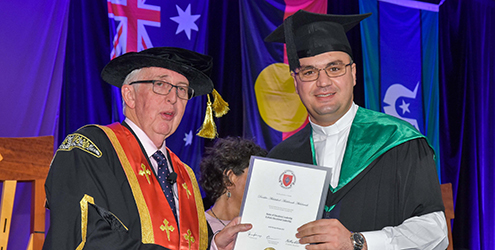
Father Dankha at his ACU graduation ceremony in 2019.
Besides jobs and hope, the university has another potential benefit.
“Setting up this university is our revenge, and our revenge is to educate people – not just Chaldeans but also Yazidis and Muslims and anyone who wants to learn,” he said.
“We have suffered because of ignorance, which drives people to violence and makes them unaccepting of each other. If you educate people and stop ignorance, you can make society a better place.”
For now, the leaders of Erbil’s Chaldean community are putting all their efforts towards establishing a stronghold of Christianity in Ankawa, a village on the outskirts of the city.
The Archdiocese will soon open Iraq’s first-and-only Catholic hospital, and ACU graduate Dr Saveen Oghana – a Chaldean scholarship recipient – will head up its medical department.
Archbishop Warda described the impending opening as “another critical piece” in the rebuilding of Iraq’s Chaldean community. He said ACU’s support had played a strong role in helping to create an environment where “our people can thrive and not simply survive”.
“Those seeds we planted together in solidarity continue to grow and they are showing their fruits to the community here daily,” Archbishop Warda said.
In May 2019, the Archbishop was given news he would receive an ACU Honorary Doctorate, in recognition of his service to the Christian community of the Middle East.
As for Fr Dankha, he labelled his time studying at ACU as “an overwhelming experience”, not only for the educational opportunity it presented, but also for the freedom and safety Australia had provided for the 20,000-strong Chaldean Catholics that resettled here.
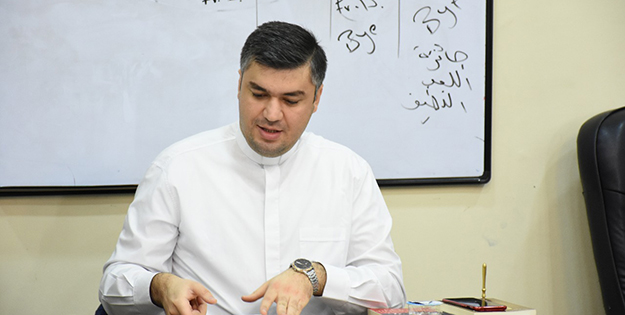
He found a sense of wonder in the fact that his culture had journeyed all the way from the Middle East to Sydney and was proud to hear his countrymen and women speaking in Aramaic – the language of Jesus Christ.
“For them, Australia is home, but they have combined the Aussie culture with their Chaldean heritage, and that, to me, is a wonderful thing,” he said.
And despite the dangers of his homeland and his continued relationship with Sydney’s Chaldean community, which he visited again in 2019, Fr Dankha said he has no plans to resettle here.
“Iraq is my place. It is where I can best express my identity and assist my people, and so it is my destiny to stay,” he said.
“When I see people here in Erbil and they are smiling, and when they say to me, ‘Father, we are happy because we have a job and we can study and get an education and even go to university’, that's when I realise that there is hope.”
Copyright@ Australian Catholic University 1998-2026 | ABN 15 050 192 660 CRICOS registered provider: 00004G | PRV12008